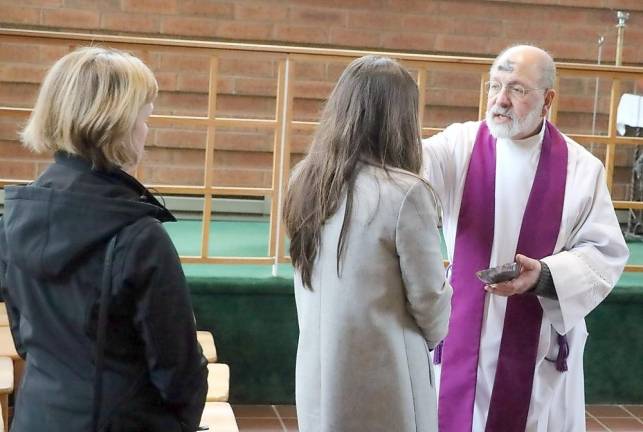Ash Wednesday, Feb. 17, marks the beginning of Lent for 2021
Warwick. COVID-19 restrictions and safety concerns prompt important changes to ash distribution.

This past Wednesday, Feb. 17, marked the beginning of the season of lent throughout the world.
The 40 days that follow are set aside as a time of penance, reflection and fasting in preparation for Easter.
Ash Wednesday is observed by many Western Christians including Catholics, Lutherans, Methodists, Anglicans and Presbyterians.
According to the gospels, Christ spent 40 days fasting in the desert. Lent reminds the faithful to fast and sacrifice 40 days, beginning with Ash Wednesday, as preparation for Easter.
Although Ash Wednesday is not a Holy Day of Obligation, in the past, most Catholics attended Mass or services to receive their ashes.
That hasn’t changed but this year, the COVID-19 restrictions and safety concerns have prompted pastors to change the way the ashes are distributed.
Ash Wednesday derives its name from the practice of blessing ashes made from palms blessed on the previous year’s Palm Sunday, which occurs a week before Easter Sunday.
According to the Catholic Encyclopedia, the name dies cinerum (day of ashes) is found in the earliest existing copies of the Gregorian Sacramentary and probably dates from at least the eighth century.
On this day all the faithful, according to ancient custom, were exhorted to approach the altar and there the priest, dipping his thumb into ashes previously blessed, marks the forehead.
As the priest, deacon or lay minister traced the sign of the cross on the foreheads of parishioners, they reminded them that life on Earth will pass away.
“Remember, you are dust, and unto dust you shall return” or the optional, “Turn away from sin and be faithful to the Gospel.”
However, this year, instead of placing the ashes on the foreheads of the parishioners, those who attended Mass or a service at Warwick’s Church of St. Stephen, the First Martyr, were given ashes contained in a small packet that were blessed and the traditional words were said to the general group.
The packets were then given out to be imposed at home.
- Roger Gavan